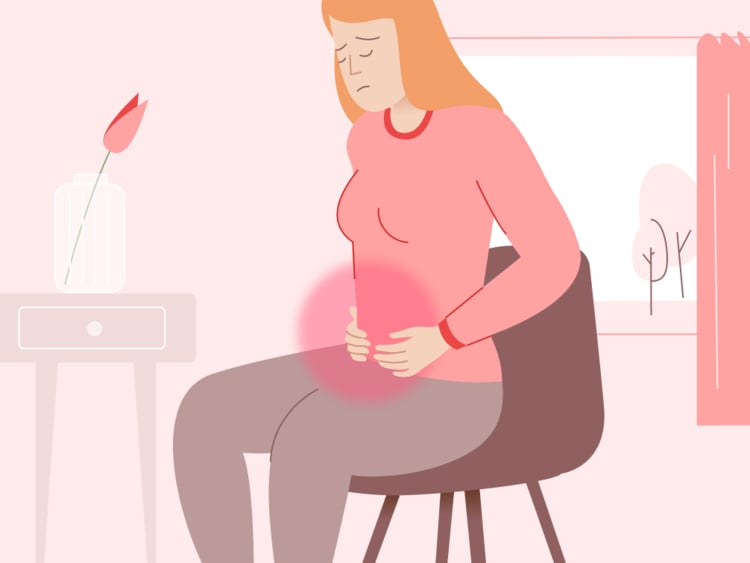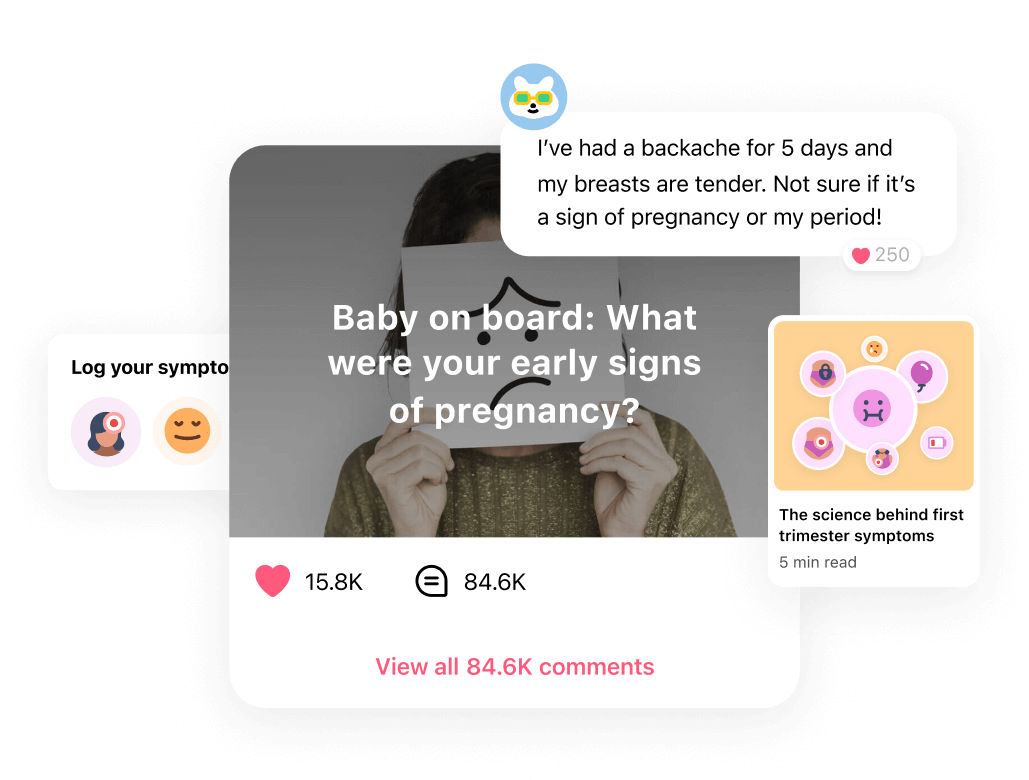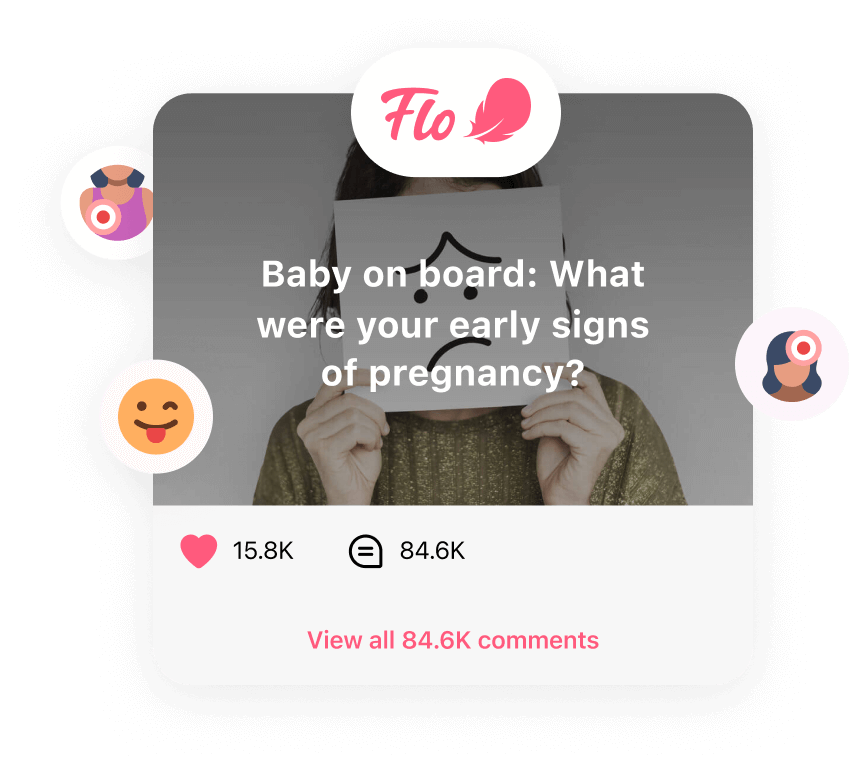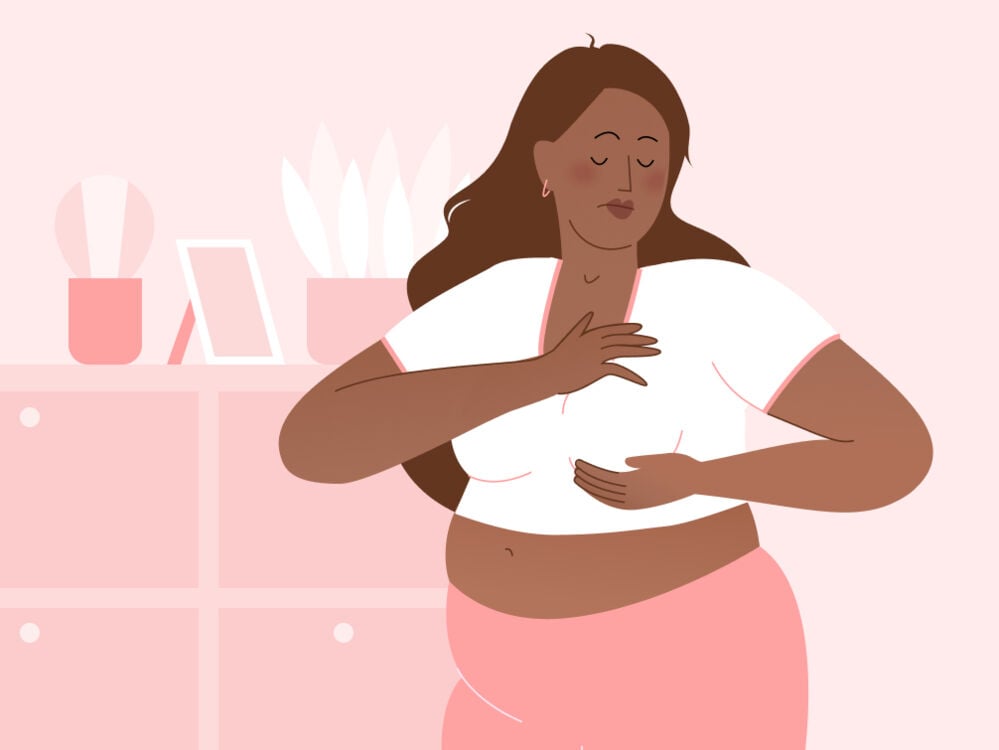Wondering whether those symptoms you’re experiencing could be PMS or pregnancy? A doctor explains how to try to tell the difference.
-
Tracking cycle
-
Getting pregnant
-
Pregnancy
-
Help Center
-
Flo for Partners
-
Anonymous Mode
-
Flo app reviews
-
Flo Premium New
-
Secret Chats New
-
Symptom Checker New
-
Your cycle
-
Health 360°
-
Getting pregnant
-
Pregnancy
-
Being a mom
-
LGBTQ+
-
Quizzes
-
Ovulation calculator
-
hCG calculator
-
Pregnancy test calculator
-
Menstrual cycle calculator
-
Period calculator
-
Implantation calculator
-
Pregnancy weeks to months calculator
-
Pregnancy due date calculator
-
IVF and FET due date calculator
-
Due date calculator by ultrasound
-
Medical Affairs
-
Science & Research
-
Pass It On Project New
-
Privacy Portal
-
Press Center
-
Flo Accuracy
-
Careers
-
Contact Us
PMS vs. pregnancy symptoms: How can you spot the difference?


Every piece of content at Flo Health adheres to the highest editorial standards for language, style, and medical accuracy. To learn what we do to deliver the best health and lifestyle insights to you, check out our content review principles.
Hormonal changes in your body can lead to all kinds of symptoms. Raise your hand if you’ve ever experienced mood swings, headaches, or bloating around the time of your period. However, it can sometimes be difficult to pinpoint exactly what’s causing those hormonal changes in the first place, especially if there’s a chance you could be pregnant.
It can be tricky to figure out whether you’re experiencing premenstrual syndrome (PMS), a condition that causes a variety of symptoms to kick in around the time of your period, or the early signs of pregnancy, considering there’s quite a lot of overlap between the two. Not very helpful, Mother Nature …
That’s why we’ve asked Dr. Marta Perez, obstetrician and gynecologist, Washington University School of Medicine, Missouri, US, to talk us through the differences between PMS and pregnancy symptoms. For more info, you can check out our guide on why you might be experiencing period symptoms but you're not on your period.

 Over
7.8M
ratings averaging
4.8/5
*
Over
7.8M
ratings averaging
4.8/5
*
Understand your body’s signals with the Flo app
- Chat with others who are trying to get pregnant.
- Get trusted information on signs of pregnancy from 100+ medical experts.
- Log your symptoms and learn what they could be trying to tell you.
 Over
7.8M
ratings averaging
4.8/5
*
Over
7.8M
ratings averaging
4.8/5
*

Trying to conceive?
The Flo app can help you through the two-week wait.

 Over
7.8M
ratings averaging
4.8/5
*
Over
7.8M
ratings averaging
4.8/5
*
Understand your body’s signals with the Flo app
- Chat with others who are trying to get pregnant.
- Get trusted information on signs of pregnancy from 100+ medical experts.
- Log your symptoms and learn what they could be trying to tell you.
Does early pregnancy feel like PMS?
If you’re asking yourself (and your internet search engine) the question, “Am I pregnant, or do I have PMS?” you’re going to want to know the facts. So, does early pregnancy feel like PMS? The answer to this is pretty straightforward. “Yes, it can,” says Dr Perez. And therein lies the confusion …
Of course, as with most things when it comes to our bodies, there’s a reason why this is. Essentially, it’s all related to hormonal changes, with similar hormones fluctuating both before a period and during the early stages of pregnancy, causing a number of symptoms to occur (we’ll take a closer look at those later on).
For example, levels of estrogen will rise before ovulation, while “levels of progesterone rise after ovulation, when an egg is released from an ovary,” explains Dr. Perez. This happens roughly midcycle, and “it works as a signal to the uterus to [welcome] a possible fertilized egg,” she adds.
After this, there are two alternative scenarios that can occur, depending on whether or not you’ve conceived. “If that egg is fertilized, and an embryo implants [into your uterine wall] in the following two weeks, you become pregnant,” Dr. Perez says. “If it is an early pregnancy you’re experiencing, then you might find symptoms are more intense around the time that you’re expecting your period.”
On the other hand, if the egg isn’t fertilized, and no pregnancy occurs, the lining of your uterus will start to shed because it’s not needed to cushion a baby. That’s when your period will start, explains Dr. Perez. If at this point the symptoms you were experiencing start to improve, it’s likely they were caused by PMS rather than pregnancy.
Take a quiz
Find out what you can do with our Health Assistant
Common PMS and pregnancy symptoms
Now that we understand why it’s tricky to tell the difference between PMS and early pregnancy symptoms, let’s take a closer look at what those symptoms might be and why they might occur.
Fatigue
Do you find it especially difficult to roll out of bed in the morning in the days leading up to your period? Turns out, there’s a reason for that. Hormonal fluctuations linked to your cycle can mean you might find yourself feeling tired or exhausted when you’re premenstrual.
Equally, that feeling of exhaustion could be an early sign of pregnancy. Dr. Perez adds that “fatigue is a very common symptom in the first trimester of pregnancy” and points to the rise in progesterone as well as “other complex mechanisms of the first trimester” as potential causes. No real surprise there, considering you are growing a whole new human from scratch!
Bloating or tummy pain
We’ve probably all experienced the discomfort of tummy pain or bloating at some point. As Dr. Perez explains, these symptoms can also be caused by changing levels of progesterone throughout our cycle. This is because progesterone has a relaxing effect on your muscles, which can then slow digestion in your stomach and intestines. “It might also encourage water and fluid retention in the body, which can make you feel bloated,” says Dr. Perez.
This means that tummy pain and bloating can both be symptoms of PMS and early pregnancy, due to changing levels of progesterone in both scenarios. You’re especially likely to experience bloating during early pregnancy, as progesterone levels rise after your egg has been fertilized. But while bloating and tummy pain are likely to ease once your period is over, they could continue if it’s a pregnancy. As Dr. Perez explains, “Other hormones will be at play here after the pregnancy is implanted, which might contribute to tummy pain or bloating.”
Breast tenderness
Yep, you guessed it: Hormonal changes are usually also responsible for your breasts feeling tender and sore. They sure have a lot to answer for! “Breast tenderness is very common for both PMS and pregnancy,” explains Dr. Perez. “Symptoms are typically the same in PMS and early pregnancy (before a missed period), but may worsen after the missed period in pregnancy as hormones continue to increase.”

Changes in appetite
Cravings and changes in appetite connected to the menstrual cycle seem to be unique to the individual, explains Dr Perez. “Many people will feel ravenous during both the PMS and early pregnancy phase,” she says. So if you find yourself reaching into your snack drawer more often than not (we’ve all been there), now you know why. It could be linked to your period, or you could be experiencing early pregnancy cravings.
However, because all of our bodies are unique, others might experience the opposite of increased hunger and cravings. This can include “food aversions, nausea, or lack of appetite in both the premenstrual and early pregnancy time,” says Dr. Perez. She explains that if this is one of your signs of early pregnancy, food aversions, nausea, and vomiting could also occur as the pregnancy goes on.
Mood swings and feeling upset, anxious, or irritable
“Mood and hormones is a complex topic,” begins Dr. Perez. “Each individual person responds differently to their own hormones, so it’s really tough to predict how someone’s hormones and mood are connected.” But what complaints might be expected during PMS or early pregnancy? “Feeling more emotional, more tearful, and noticing bigger changes in emotional swings are the trends I hear discussed,” she explains.
So if you find yourself feeling less in control of your mood and emotions around this time, try not to blame yourself. Your mind and body are dealing with a lot of hormonal changes (whether due to your cycle or a pregnancy), and it’s perfectly natural to react to this. However, if you do find that mood swings or emotional changes are affecting your day-to-day life in a serious way, it might be time to reach out to your doctor, who can talk things through with you and discuss any potential treatment options that could help.
Symptoms unique to pregnancy
While the symptoms described above can be experienced during both early pregnancy and PMS, there are a couple of symptoms that are only experienced during pregnancy. Keep an eye out for these, and if you think there’s a reason to, consider taking a pregnancy test.
Frequent urination
Needing to pee more often can happen for many reasons during the very early phases of pregnancy, and there’s a good reason why. Blood levels increase during pregnancy, which means “our kidneys filter our blood at higher rates during pregnancy. Then as the uterus grows, it sits on the bladder, which might have less room to expand, making someone feel like they need to urinate sooner and more frequently than before,” explains Dr. Perez. This is nothing to worry about, but Dr. Perez adds that you should get checked for infection by a doctor if you have any pain peeing or if you spot any blood in your urine.
Darker nipples
Your body undergoes lots of changes during pregnancy, and this might be one of the ones you didn’t expect. But darker nipples are actually “a common sign of pregnancy,” says Dr. Perez. “The color deepens over the course of pregnancy, along with other skin changes like linea nigra [the dark skin stripe that can appear upward and downward from the belly button]. Evolutionarily, these changes probably helped increase the contrast on our skin so that newborns could find the nipple to eat after birth.”
How to tell the difference between PMS and pregnancy
With so many symptoms in common, trying to tell the difference between PMS and pregnancy can be super challenging. With that in mind, the best way to tell if your symptoms are PMS or pregnancy is to do an at-home pregnancy test.
When should you take a pregnancy test?
For the most accurate results, Dr. Perez advises that “it’s a good idea to take a pregnancy test if your period is late by two days or more, especially if you have recently had unprotected or under-protected intercourse.” If you’re unsure, you can use Flo’s handy pregnancy test calculator to help you figure out whether it’s time to take a test.
PMS vs. pregnancy symptoms: The takeaway
There’s no getting around the facts: It can be frustratingly difficult to tell the difference between PMS and pregnancy symptoms. If you're fertility tracking in the hope of getting pregnant, it can feel a little like a rollercoaster at this time in your cycle. Not only are a lot of the symptoms of PMS and early pregnancy the same, but they will also occur at around the same time (we can blame Mother Nature for this one).
So if you’re experiencing any of the following symptoms, it could be tricky to tell if you’re experiencing PMS or the early stages of pregnancy, until it comes to the time to take a pregnancy test:
- Fatigue
- Bloating or tummy pain
- Breast tenderness
- Changes in appetite
- Mood swings or feeling upset, anxious, or irritable
However, if you’re experiencing an increased need to pee or you’ve noticed that your nipples are darker than usual, these could both be early signs of pregnancy that you wouldn’t experience with PMS. In that case, it’s a good idea to take a pregnancy test when the time is right. Either way, hopefully you’ll get an explanation for what your symptoms mean soon enough.


Hey, I'm Anique
I started using Flo app to track my period and ovulation because we wanted to have a baby.


The Flo app helped me learn about my body and spot ovulation signs during our conception journey.


I vividly
remember the day
that we switched
Flo into
Pregnancy Mode — it was
such a special
moment.
Real stories, real results
Learn how the Flo app became an amazing cheerleader for us on our conception journey.
References
“1st Trimester Pregnancy: What to Expect.” Mayo Clinic, 8 Mar. 2022, www.mayoclinic.org/healthy-lifestyle/pregnancy-week-by-week/in-depth/pregnancy/art-20047208.
“Estrogen.” Cleveland Clinic, my.clevelandclinic.org/health/body/22353-estrogen. Accessed 16 Jan. 2023.
“Pregnancy: How Your Digestion Changes.” University of Rochester Medical Center, www.urmc.rochester.edu/encyclopedia/content.aspx?contenttypeid=90&contentid=P09521. Accessed 16 Dec. 2022.
“Hormones during Pregnancy.” Johns Hopkins Medicine, 19 Nov. 2019, www.hopkinsmedicine.org/health/conditions-and-diseases/staying-healthy-during-pregnancy/hormones-during-pregnancy/.
“Menstrual Migraines: Treatment, Pain Relief & Symptoms.” Cleveland Clinic, my.clevelandclinic.org/health/diseases/8260-menstrual-migraines-hormone-headaches. Accessed 16 Dec. 2022.
“Test ID: PGSN.” Mayo Clinic Laboratories, www.mayocliniclabs.com/test-catalog/overview/8141. Accessed 16 Dec. 2022.
“Premenstrual Syndrome (PMS).” Mayo Clinic, 25 Feb. 2022, www.mayoclinic.org/diseases-conditions/premenstrual-syndrome/symptoms-causes/syc-20376780.
“The Menstrual Cycle: Menstruation, Ovulation, and How Pregnancy Occurs.” The American College of Obstetricians and Gynecologists, www.acog.org/womens-health/infographics/the-menstrual-cycle. Accessed 16 Dec. 2022.
“Doing a Pregnancy Test.” NHS, www.nhs.uk/pregnancy/trying-for-a-baby/doing-a-pregnancy-test/. Accessed 16 Dec. 2022.
“Vomiting and Morning Sickness.” NHS, www.nhs.uk/pregnancy/related-conditions/common-symptoms/vomiting-and-morning-sickness/. Accessed 16 Dec. 2022.
“Symptoms of Pregnancy: What Happens First.” Mayo Clinic, 3 Dec. 2021, www.mayoclinic.org/healthy-lifestyle/getting-pregnant/in-depth/symptoms-of-pregnancy/art-20043853.
History of updates
Current version (19 January 2023)
Published (19 January 2023)
In this article

Get your personal guide to fertility
-
Learn how to read your body's ovulation signals
-
Find daily conception tips from our experts
-
Chat with others who are trying to get pregnant




